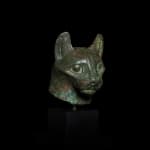Egyptian
An Egyptian bronze cat head, Late Period, circa 664 - 30 BC
Bronze
Height: 6.7 cm
Further images
Hollow cast, the naturalistically-modelled face with large eyes and defined cheekbones, the details of the ears and whiskers incised.
Hollow cast, the naturalistically-modelled face with large eyes and defined cheekbones, the details of the ears and whiskers incised.
Provenance
Private collection, France, 1980sHotel Drouot, J-M Delvaux, 29 June 2005, lot 159
With Rupert Wace Ancient Art, London, 2005
Private collection, Switzerland, acquired from the above
Literature
The cat was sacred to the goddess Bastet. A cat-headed goddess of protection, good health and fertility, Bastet was originally a fierce warrior goddess, but came to embody more domestic functions of household protection and as a goddess of pregnancy and childbirth.Her cult centres, called Bubasteion, were numerous in Egypt however the main one was in the Nile delta region, in the modern city of Tell Basta (called Per-Bastet in Ancient Egypt and Bubastis in Greek). Bronze and wood cat statuettes were placed as votive offerings at these sanctuaries; some were hollow and held cat mummies, preserving the remains for eternity.
For discussion of cats and Bastet in ancient Egypt see D. Arnold, 'Katze' in Falken, Katzen, Krokodile: Tiere im Alten Ägypten: Aus den Sammlungen des Metropolitan Museum of Art, New York, und des Ägyptischen Museums Kairo, Zurich, 2010; J. Malek, The Cat in Ancient Egypt, London, 1993.





